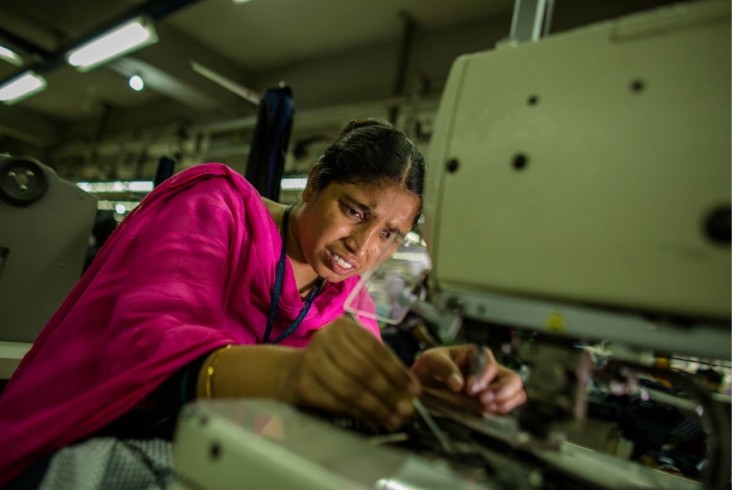- What We Do
- Agriculture and Food Security
- Democracy, Human Rights and Governance
- Democracy, Human Rights and Governance Strategy
- Supporting Free and Fair Elections
- Supporting Vibrant Civil Society & Independent Media
- Protecting Human Rights
- Promoting Accountability & Transparency
- Importance of Democracy, Human Rights, & Governance to Development
- COVID-19: Issues and Potential USAID Responses
- Countering Trafficking in Persons
- Global Labor Program
- Religious Freedom
- Youth Impact
- Economic Growth and Trade
- Education
- Environment and Global Climate Change
- Gender Equality and Women's Empowerment
- Global Health
- Humanitarian Assistance
- Transformation at USAID
- Water and Sanitation
- Working in Crises and Conflict
- U.S. Global Development Lab
Speeches Shim

Work is central to most people’s daily lives. As such, labor issues and the ways in which workers express their rights are topics that affect many of USAID’s development objectives. USAID’s Global Labor Program (GLP) was created in order to increase the capacity of worker organizations to promote these basic human rights, increase access to justice for employees, and to advance decent work worldwide. Part of these efforts include the promotion of gender equality and ensuring the rights of vulnerable populations such as migrants and those working in the informal sector.
Global Labor Program Objectives:
The current five-year program (2016-2021) is being implemented by the Solidarity Center. With USAID’s backing and support, the Solidarity Center promotes labor rights and access to justice for workers around the world. Specifically, the current award supports country programs in Cambodia, Bangladesh, Ukraine, Georgia, Morocco, Lesotho, Liberia, South Africa, Colombia, and Mexico. There are also regional programs in South Asia, Southeast Asia, the Middle East and North Africa, Southern Africa, and Latin America that cover activities in 31 countries. All program activities are designed to be inclusive of vulnerable populations, including women. Accordingly, activities often include grassroots trainings that address gender-based violence at work. Across country and regional programs, the GLP has adapted its interventions in recognition that the COVID-19 pandemic represents the greatest challenge this generation to vulnerable workers.
Examples of Funded Countries:
Cambodia:
The GLP program in Cambodia builds on past successes, utilizing lessons learned from an extensive program that addresses both new challenges and ongoing constraints for workers, especially women. Activities build the capacity of union partners to negotiate for improved wages and benefits, as well as full access to legal entitlements for their members. Grassroots partners, in turn, advocate for improved coverage of minimum wage legislation. While promoting the rule of law through legal assistance, research and analysis, and legislative advocacy, the GLP in Cambodia provides unions and civil society partners with the skills needed to engage in legal reform initiatives and evidence-based advocacy campaigns. Activities also support partners engaging in advocacy for improved dispute resolution processes and structures.
Lesotho:
In September 2019, the Global Labor Program received $1 million to combat gender-based violence and harassment (GBVH) in Lesotho textile mills. Through this investment, activities leverages an additional $1.5 million over two years from global clothing brands that source from these same mills. With the private sector, labor unions, and USAID working together, the activity helps ensure a workplace free of GBVH. It accomplishes this through workplace trainings, establishing grievance mechanisms for people affected by GBVH, and by engendering a culture of mutual respect. The effort also includes two local women’s non-governmental organizations that have experience in protecting workers against GBVH.
Examples of Global/Regional Programs:
Migrant Workers in Asia:
The GLP program promotes the empowerment of migrant workers in Asia, especially women workers, both in terms of their origin countries (such as Indonesia and Cambodia) and their destination countries (such as Thailand and Malaysia). The program partners include national unions with affiliates in multiple sectors and all are affiliated with either the Association of Southeast Asian Nations (ASEAN) Trade Union Council (ATUC), or the South Asian Regional Trade Union Council (SARTUC.) These unions and other migrant worker organizations work together to engage governments and businesses in the monitoring and oversight of labor recruiters. This helps cut down on abuse and trafficking of people vulnerable to exploitation. The project also conducts advocacy in concert with employers to implement ethical labor recruitment standards, such as the elimination of recruitment fees. As a result of these activities, migrants are safer and more able to earn a living to support their families.
Resources:
- USAID/Medium Blog: Remembering the Workers of Rana Plaza

Comment
Make a general inquiry or suggest an improvement.